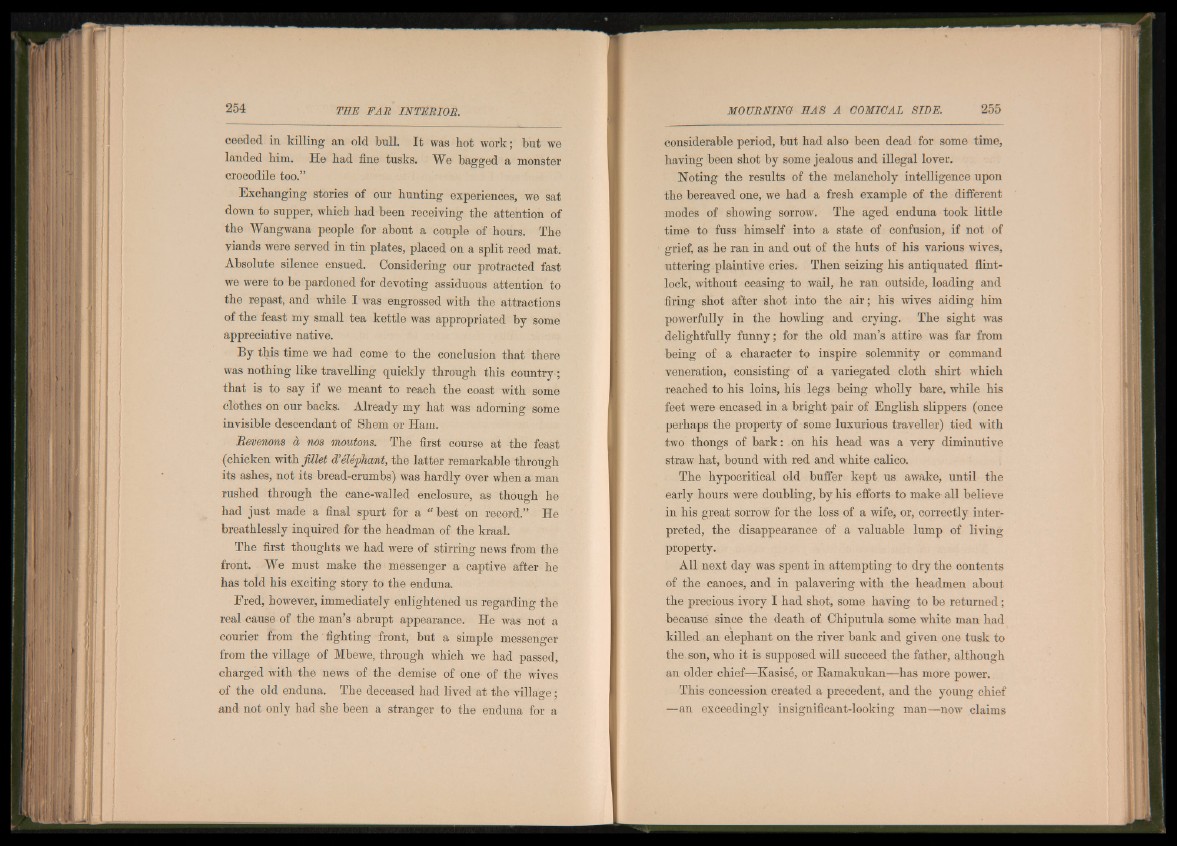
ceeded in killing an old bull. I t was hot work; but we
landed him. He had fine tusks. We bagged a monster
crocodile too.”
Exchanging stories of our hunting experiences, we sat
down to supper, which had been receiving the attention of
the Wangwana people for about a couple of hours. The
viands were served in tin plates, placed on a split reed mat.
Absolute silence ensued. Considering our protracted fast
we were to be pardoned for devoting assiduous attention to
the repast, and while I was engrossed with the attractions
of the feast my small tea kettle was appropriated by some
appreciative native.
By this time we had come to the conclusion that there
was nothing like travelling quickly through this country ;
that is to say if we meant to reach the coast with some
clothes on our backs. Already my hat was adorning some
invisible descendant of Shem or Ham.
Bevenons a, nos moutons. The first course at the feast
(chicken with fillet d’elephant, the latter remarkable through
its ashes, not its bread-crumbs) was hardly over when a man
rushed through the cane-walled enclosure, as though he
had just made a final spurt for a “ best on record.” He
breathlessly inquired for the headman of the kraal.
The first thoughts we had were of stirring news from the
front. We must make the messenger a captive after he
has told his exciting story to the enduna.
Fred, however, immediately enlightened us regarding the
real cause of the man’s abrupt appearance. He was not a
courier from the fighting front, but a simple messenger
from the village of Mbewe, through which we had passed,
charged with the news of the demise of one of the wives
of the old enduna. The deceased had lived at the villa©g e:*
and not only had she been a stranger to the enduna for a
considerable period, but had also been dead for some time,
having been shot by some jealous and illegal lover.
Noting the results of the melancholy intelligence upon
the bereaved one, we had a fresh example of the different
modes of showing sorrow. The aged enduna took little
time to fuss himself into a state of confusion, if not of
Og rief,7 as he ran in and out of the huts of his various wives,
uttering plaintive cries. Then seizing his antiquated flintlock,
without ceasing to wail, he ran outside, loading and
firing shot after shot into the air; his wives aiding him
powerfully in the howling and crying. The sight was
delightfully funny; for the old man’s attire was far from
being of a character to inspire solemnity or command
veneration, consisting of a variegated cloth shirt which
reached to his loins, his legs being wholly bare, while his
feet were encased in a bright pair of English slippers (once
perhaps the property of some luxurious traveller) tied with
two thongs of bark: on his head was a very diminutive
straw hat, bound with red and white calico.
The hypocritical old buffer kept us awake, until the
early hours were doubling, by his efforts to make all believe
in his great sorrow for the loss of a wife, or, correctly interpreted,
the disappearance of a valuable lump of living
property.
All next day was spent in attempting to dry the contents
of the canoes, and in palavering with the headmen about
the precious ivorv I had shot, some having to be returned;
because since the death of Chiputula some white man had
killed an elephant on the river bank and given one tusk to
the son, who it is supposed will succeed the father, although
an older chief—Kasise, or Ramakukan—has more power.
This concession created a precedent, and the young chief
—an exceedingly insignificant-looking man—now claims